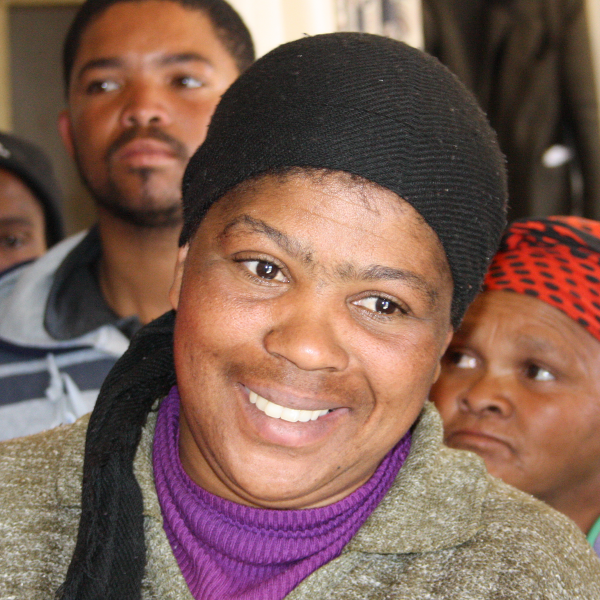

Farm worker Mercia Plaatjies fears that the upcoming increase in the minimum wage won’t make much of a difference to her life. Photo supplied.
8 January 2015
The minimum wage for farm workers is due to increase at the end of February. But seasonal worker Mercia Plaatjies doesn’t expect the increase to make much difference to her life.
On Tuesday afternoon, temperatures near Montagu in the fruit growing Koo valley, topped 37 degrees Celsius. Plaatjies, a seasonal worker and resident on a farm which grows pears, apricots and other fruit, took ten minutes during her lunch break to speak about her budget and the prospects of a pay rise.
At 1pm, she was back in an apricot orchard picking fruit by hand in what she described as a “sweltering” sun.
Manual labour in these conditions is tough, but she has little choice. Her only employment for the year comes during the pre-harvest and picking season – November to March – when she says she earns about R525 for a week’s work. This wage reflects the legal minimum for 2013 and has not been amended in line with last year’s increase to R558.60 per week.
Plaatjies’ husband works on the farm all year round, for the same pay during the summer time. But his working hours and income decrease in winter. So the couple rely on the harvest season, when the income of the family of five is just over R1,000 a week, to see them through. Yet, Christmas and the beginning of the school year (two of the Plaatjies’ daughters are boarders at a high school in Montagu) make saving nearly impossible.
Plaatjies says she has to spend between R300 and R400 a month on prepaid electricity and around R200 on rent paid to the farmer for accommodation. These expenses are new, introduced by her employer after the general rebellion among farm workers throughout the province in 2012/2013. In the wake of the strikes Labour Minister Mildred Olifant raised the weekly wages from R345 (R69 a day) to R525 (R105 a day), with clauses outlining annual increases for two years.
At the end of February, the legislated minimum wage for farm work will be increased, by the inflation rate plus 1.5 percentage points. Based on the November inflation rate of 5.8%, this means farm worker minimum wages would go up by just over 7%, or about 90c a day.
“We were part of the strikes because we believed that standing up against our exploitation would help us,” said Plaatjies, who says she has to to buy her own work overalls from her employer - another apparent breach of the document which outlines pay structures in the sector.
“But, in actual fact, we believe that we are worse off now than before.”
Plaatjies uses a child support grant to pay for her two teenage daughters’ boarding school costs in Montagu. At home she spends what is left of her salary, after deductions, on potatoes, meat off-cuts, sugar, flour and bread. Her three-year-old boy often goes to bed hungry when the family’s income is cut by more than half during winter, the off-season.
She is not sure whether she and her husband will benefit from the increase set down for 1 March. Judging by their current weekly pay, it appears that their wages have stayed static through at least one previous national minimum pay hike.
Gerrie Regue, 36, has worked and lived on a fruit and wine farm outside Robertson for ten years. He earns the legal minimum wage: R560 a week. What income he has left after rent, schooling costs for his nine-year-old daughter, and payments to a furniture store in Robertson, is spent on food. Again, potatoes, flour, sugar and meat off-cuts are the family staples. For him too, new deductions for rent have all but nullified the pay increases after the strikes. He fears that he will not be able to support his daughter through high school to attain her matric.
“Sometimes it’s possible for me to save R10 or R20 in a week,” he says. “But I can’t put it away because I know that next week there will be something else, something extra - like a debt, or trip into town or a visit to the doctor or something, that needs to be paid for. And the cost of things is rising.”
“An increase would be nice, but we know that it all comes to the same in the end.”